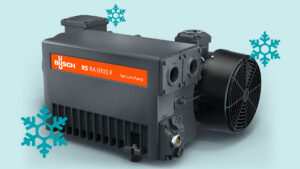Lowara pumps equipped with Hydrovar produce premium strawberries
On a new strawberry farm in Queensland, Australia, the grower was faced with multiple and varied demands on water requirements for crop irrigation and other tasks on the farm. Helping to cope with a wide variety of water needs is a set of all stainless steel Lowara pumps equipped with the Hydrovar control system.
Strawberries are big business in Queensland, Australia. Just north of Brisbane, on Australia's east coast, Queensland grows about 350 hectares of strawberries each year, mainly along the coastal strip from Caboolture to Gympie.
The industry supplies fruit from about May to October when the warmer winter and spring conditions of coastal Queensland enable strawberry plants to grow and produce the fruit. Growing strawberries is popular in this area because quick returns can be made from small areas of land with relatively little capital investment. Most of the premi-um strawberry crop is grown for the metropolitan wholesale markets in Brisbane, Sydney, Melbourne and Adelaide, south of the prime growing areas.
New Methods for New Farm One premium strawberry grower has recently established a new 200-acre farm for growing the berries in the semi-agri-cultural area known as Cabooltura. Strawberries are a high-risk crop, with very little room for error. The berries need to be monitored closely for the duration of the growing season and any problems need to be dealt with quickly. These mon-itoring duties apply especially to the water supply.
Craig Priestley, the ITT Fluid Technology Australia account manager for Queensland said that, "Through our dealer network, this farmer purchased 5 SHE50250-220 Lowara pumps." "They are 22 kw units, equipped with Hydrovar control systems on a single base." Priestley notes that with the control panels, the pump and the base, "We have a pump set size of about 4 meters by 3 meters - quite a substantial pump set." The water supply for the farm comes from a newly dug, dammed storage reservoir that is fed by a spring. Because of the digging and the fact that the farm land is under considerable construction, the water has mixed with acids within the soils, lowering ph level of the water. Over time, the slightly acidic level of the water will eventually neutralize. But for now, any water handling system must deal with varying levels of ph. Priestley recalls that, "One of the major reasons we went with the Lowara product is because of the all 316 low-carbon stainless steel of the pumps." "Because the ph level of the water will vary, if you use dissimilar metals in a pump, such as cast iron and galvanized pipe fittings, you can have
a reaction to the water."
Varied Water Demands
The water demands at the strawberry farm were very com-plex - not the least because of the strawberry's lifecycle. Immediately upon planting, the strawberries initially require a large sum of water. This lasts for the entire length of their three week first growth stage. The strawberries receive their rations of water through two forms of irrigation. The first type of irrigation is an overhead style with impact sprinklers. Additionally, there is an irrigation process known as "fertiga-tion" which uses a drip tape underneath the strawberries. The water supply for the irrigation system has to be extreme-ly reliable. Priestley says that "because of the excessive heat and erratic weather patterns in the growing area, if the farm gets a hot day, they'll need to be able to get water onto the actual leaves of the strawberry plant to take the heat stress away from the plant itself."
The "Money Berry"
In Australia, they call the strawberry the "money berry". The reason for this is that a fist-sized amount of strawberries –consisting of about 10 to 12 premium strawberries, can cost between 3 to 4 dollars Australian (approximately $1.50 to $2.00 U.S.) For premium strawberries - large unblemished berries – the grower can get a market value price of between 7 and 8 dollars Australian per kilo (2.2 pounds). However, if the product is stressed, which, accord-ing to Priestley happens 9 times out of 10 because of the lack of water or poor irrigation, the berries become classified as a "seconds" product. These "seconds" get used in products such as strawberry jams and other products where the actual berry is not seen - with the per kilo market price for the grower at about 80 cents. With that type of risk/reward scenario, it is understandable that with 200 acres of strawberries under cultivation, a grower would want to have the most reliable pumping strategy that is right for the varied appli-cations at the farm.
Beyond Irrigation
In addition to the irrigation, the Hydrovar-equipped Lowara pumps comprise the complete control plant for the whole 200 acre farm. The pumps will service the wash-down service for the packing sheds as the procedure of picking takes place. Water is also needed for cooling the pack-ing machines as well as washing down tractors and other farm implements. Because the varied water flows required the use of variable frequency drives, the Hydrovar-controlled Lowara pumps were a perfect fit. Priestley notes that, "The customer specifically requested the technology of the Hydrovar because of its flexibility and it's reliability." The Hydrovar-equipped pumps start on less than 1 amp and also vary the voltage. This will allow the pump set to provide large energy savings. Priestley explains that, "In an instance where the farm may not be irrigating, but instead, running a packing shed or wash down hoses for tractors, the pumps are only using the horsepower required for that duty point." Priestley continues, noting that, "This is instead of using six-speed, end-suction motor pumps where you would be using 22-Kw on a single hose." "With that approach, you may have all sorts of problems taking place, including water shock in the lines - where you have cracking a splitting of the PVC lines." "Because the Hydrovar has a soft start/stop/stall appli-cation, you have none of the of potential problems that you would encounter with a with a large booster set." This Hydrovar-equipped Lowara pump set will also have the capability of hooking up up an 8 inch diesel drive end suction on the discharge line in order to provide irrigation water in the case of a power supply failure. With the farm now beginning cultivation, the initial installation will consist of three Hydrovar-controlled Lowara pumps, with two additional pumps coming on line as the planting proceeds through the 200 acres. The owner of this new strawberry farm has plans for the farm beyond just selling berries to the major food distributors. He is planning a "theme park", based around Strawberries. With an working title of "Strawberry World", the public will be invited to a center where they can sample different types of
strawberry products and take part in other fun activities. From the irrigation requirements to the fluctuating acid levels of the water supply to the power and maintenance savings, the Hydrovar-equipped Lowara pumps will play a crucial part in producing the "money berries" for this Australian grower.
About LOWARA
Lowara Srl Montecchio Maggiore, Vicenza, (www.lowara.com) which is part of the ITT Industries group, is a leader in the manufacture of hydraulic pumps and water handling and control systems. It has 900 employees in Europe, 730 operating in Italy. In 2000 its consolidated sales totalled over 150 million dollars, or over 300 billion lire. ITT Industries, Inc. (www.itt.com) is a global, multi-industry company with leading positions and advanced technologies in its served markets. The company reported revenues of $4.8 billion in 2000 from its four segments: Connectors & Switches, Defense Products & Services, Pumps & Complementary Products and Specialty Products.ITT Industries employs approximately 38,000 people around the world. In addition to the New York Stock Exchange, ITT Industries' common stock is traded on the Midwest, Pacific, London, Frankfurt and Paris exchanges.
Source: Xylem Inc.







